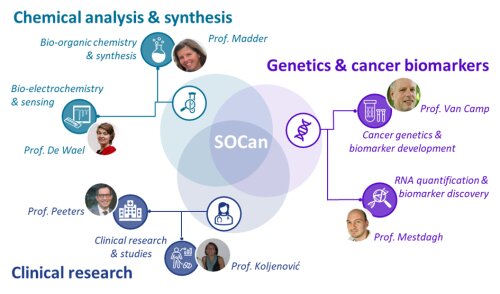The interuniversity research project SOCan aims to develop a ground-breaking photoelectrochemistry-based ‘SOCan technology’ for the fast detection of clinically relevant levels of nucleic acid cancer biomarkers in patient samples. A consortium of three organizations receives a subsidy of 3 million euro for this iBOF project.
Cancer refers to the uncontrollable growth and spread of body cells, affecting tissue and organs, and is mainly linked to cellular DNA changes. Cancer is a leading cause of death worldwide, accounting for 9.6 million deaths and 18.1 million diagnoses in 2018, where Europe accounts for 25% of global cancer cases, despite representing 10% of the world population. Cancer can affect anyone at any time, with challenges in both diagnosis and treatment. In recent decades, molecular biomarker testing became more important to enable oncologists to specifically diagnose cancers and to accurately match therapies to individual patients. However, routine biomarker detection technologies come with significant challenges: high cost, complexity, requiring specialist knowledge, low miniaturization potential and limited accessibility.
SOCan will address these bottlenecks in current molecular testing methods by developing, optimizing and validating an innovative solution to detect DNA alterations and RNA, selectively and specifically. The technology relies on singlet oxygen-based photoelectrochemistry and combines (i) photosensitizers that produce singlet oxygen upon illumination; (ii) capture and detection probes; (iii) redox reporters; and (iv) magnetic beads for immobilization and enhancing sensitivity. Such a platform is highly sensitive, robust, fast, easy to setup and allows for re-use.
Interdisciplinary collaboration
The SOCan project builds on vast knowledge in electrochemical sensing (Prof. Karolien De Wael, A-Sense Lab, UAntwerp), bio-organic synthesis (Prof. Annemieke Madder, Organic and Biomimetic Chemistry Research Group, UGhent), (epi)genetics (Prof. Guy Van Camp, Human Molecular Genetics, UAntwerp), transcriptomics (Prof. Pieter Mestdagh, oncoRNALab, UGhent), liquid biopsies, molecular testing and biomarker clinical research (Prof. Senada Koljenović & Prof. Marc Peeters, Pathology & oncology department, UZA) to build a game-changing platform for rapid detection of clinically relevant levels of nucleic acid cancer biomarkers in tissue and liquid biopsies.
